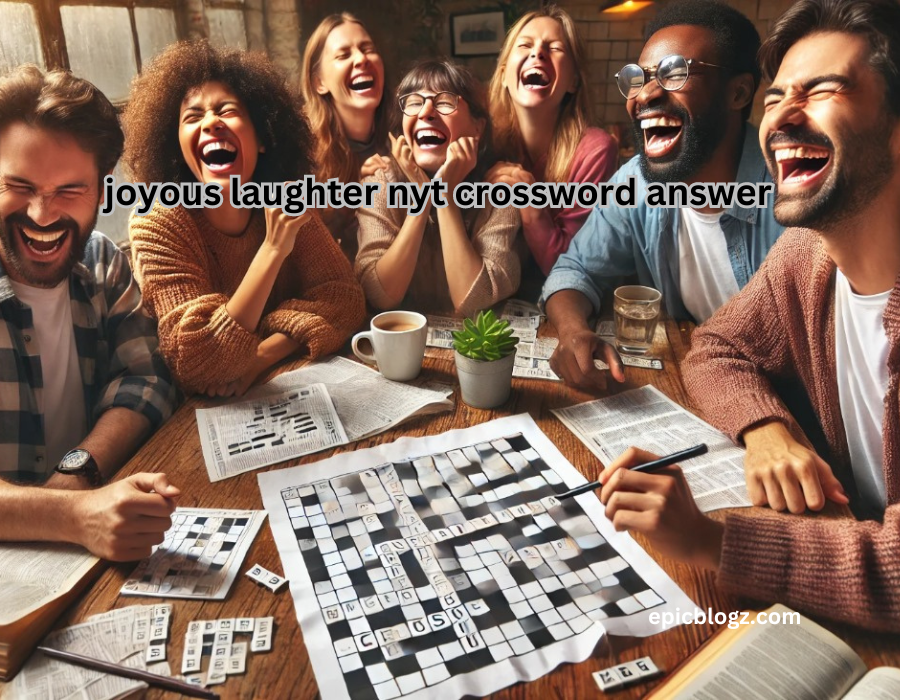Introduction
Crossword puzzles are a delightful way to challenge your brain, but they can sometimes throw curveballs that leave you scratching your head. One such clue that has popped up frequently in The New York Times Crossword is “Joyous Laughter NYT”. If you’re a seasoned puzzler, you’ve probably encountered this clue more than once. The answer? Guffaw.
But what exactly is a guffaw? Why is it used in crosswords so often, and what makes it a perfect fit for clues describing laughter? In this blog, we’ll explore the definition of a guffaw, its origins, why it’s so frequently seen in crossword puzzles, and how to approach solving this type of clue with ease. By the end, you’ll have a deeper appreciation for this loud burst of laughter and the role it plays in crossword solving!
What is a Guffaw?
Let’s start by breaking down the meaning of the word guffaw. In its simplest terms, a guffaw is a loud, unrestrained burst of laughter. It’s not a quiet chuckle or a polite giggle—it’s the kind of laughter that bursts out uncontrollably, often in response to something extremely funny. If you’ve ever laughed so hard that your sides hurt or you couldn’t catch your breath, you’ve experienced a guffaw.
Joyous Laughter NYT is not just any laughter; it’s joyous, hearty, and, sometimes, downright contagious. This kind of laughter tends to draw attention because it’s so uninhibited and genuine.
Here’s the dictionary definition of guffaw:
- Guffaw (noun): A loud and boisterous laugh.
- Guffaw (verb): To laugh in a loud or boisterous way.
When you think of a guffaw, picture someone doubling over with laughter, possibly causing everyone around them to join in due to the sheer joy and exuberance of the moment.
Origins of the Word “Guffaw”
While guffaw is commonly used in English today, it has an interesting history. The word guffaw is believed to have originated in the early 18th century and is likely of Scottish origin. It’s thought to be an imitative word, meaning its sound resembles the noise it describes. Much like “giggle” sounds like the soft, repeated laughter it represents, guffaw mirrors the hearty, robust sound of loud laughter.
This makes the word a perfect fit for both casual conversation and crossword puzzles, as it’s short, expressive, and perfectly captures the idea of unrestrained, joyous laughter.
Why “Guffaw” is Common in NYT Crossword Puzzles
Now that we know what a guffaw is, let’s explore why it appears so often in crossword puzzles, especially in the NYT Crossword.
1. Length and Structure
Crossword puzzles often include words that fit neatly into the grid while maintaining a balance of vowels and consonants. Guffaw is a six-letter word with an interesting structure: two F’s, a U, and an A. This makes it versatile and useful for puzzle constructors who need a word with an unusual but balanced combination of letters. It’s a relatively short word, making it a perfect fit for small to mid-size grids.
2. Uncommon but Recognizable
While guffaw isn’t a word you hear every day, it’s still widely recognized, especially by crossword enthusiasts. It’s a step above simpler words like “laugh” or “chuckle,” which makes it ideal for crosswords where the challenge is finding the right word that isn’t immediately obvious. The word’s relative rarity in everyday conversation adds a layer of difficulty to the puzzle, but its joyful connotation makes it fun to solve.
3. Cultural and Linguistic Appeal
Crossword puzzles often rely on culturally rich words or those with interesting linguistic backgrounds. Joyous Laughter NYT checks both boxes due to its Scottish origins and its specific description of a type of laughter. Puzzle creators love using words that aren’t just functional but also carry a bit of history or cultural flair.
4. Evocative Meaning
Crossword clues often aim to evoke a specific feeling or image. Words like “guffaw” instantly bring to mind a scene of joyous laughter, making it a satisfying word for solvers to uncover. The word’s robust sound and the imagery of someone laughing uncontrollably fit perfectly into the playful nature of many crossword puzzles.
How to Solve Crossword Clues Like “Joyous Laughter”
When faced with a crossword clue like “joyous laughter,” it helps to follow certain strategies. Solving clues that describe laughter or emotions can be tricky, but here are a few tips that can help you get to the answer, especially when guffaw is the solution.
1. Pay Attention to Letter Count
The first thing you should always do when tackling a crossword clue is look at the number of letters required for the answer. If the clue is something like “joyous laughter” and the answer requires six letters, you can narrow down your options. Knowing that guffaw fits this letter count makes it an immediate contender for the solution.
2. Consider Synonyms for Laughter
Crosswords often use synonyms to guide solvers toward the correct word. For a clue like “joyous laughter,” you should first brainstorm different words for laughter. Think about options like chuckle, giggle, snicker, or cackle. Then, based on the letter count and any letters you’ve already filled in, you can narrow your guesses. If the clue specifies joyous laughter, this rules out quieter, less boisterous words, making guffaw more likely.
3. Look for Letter Patterns
As you solve intersecting words in the crossword grid, you’ll start to reveal certain letters that make up the answer to “joyous laughter.” Guffaw is especially recognizable because it contains two F’s, which is an uncommon letter to repeat in most words. If you spot a double F in the puzzle, guffaw should be one of your top guesses.
4. Focus on Contextual Clues
Sometimes, crossword puzzles have themes, and understanding the theme can help guide you to the correct answer. If the puzzle has a joyful or celebratory theme, the clue “joyous laughter” might align with that, making a word like guffaw a logical choice. Always consider the bigger picture when solving clues, as themes can offer important context.
5. Use a Crossword Solver for Extra Help
If you’re completely stuck, don’t hesitate to use a crossword solver tool. These can help you input clues and letter counts to suggest possible answers. While solving without help is more rewarding, tools like this can be useful if you’re on a tight deadline or just need a little nudge.
Different Types of Laughter in Crossword Clues
Joyous Laughter NYT is one of the more common words used to describe joyous laughter in crossword puzzles, it’s not the only one. Crossword clues may ask for various types of laughter, each with its own distinct meaning and nuance. Here’s a quick guide to different laughter-related words you might encounter in crosswords:
1. Giggle
A giggle is a light, often nervous or silly laugh. If a crossword clue hints at laughter but specifies something more subdued or childlike, giggle is likely the answer. It’s a shorter word (six letters), which also fits well in crossword grids.
2. Chortle
A chortle is a soft, joyful laugh, a combination of chuckling and snorting. It’s a playful word, often used in crosswords when the clue points to gentle or happy laughter.
3. Snicker
Snicker refers to a more sly, subdued laugh, often associated with quiet amusement or mischief. If a crossword clue involves a hint of secrecy or sarcasm in the laughter, snicker could be the solution.
4. Cackle
A cackle is a loud, harsh laugh, often associated with witches in folklore. If the clue implies something more sinister or loud in a negative way, cackle might be the word you’re looking for.
5. Titter
A titter is a quiet, often stifled laugh. If the crossword clue suggests embarrassment or something more restrained, titter could fit the bill.
Understanding the subtle differences between these types of laughter is key to successfully solving crossword clues that describe laughing. Guffaw, however, stands out as one of the most joyous and hearty forms of laughter, making it a common and rewarding answer.
Conclusion
When faced with the NYT crossword clue “joyous laughter,” the word guffaw is often the perfect solution. It captures the essence of unrestrained, hearty laughter in a way that few other words can. Knowing the meaning, origin, and significance of this word not only helps you solve crossword puzzles but also adds depth to your understanding of the language.
Whether you’re new to crosswords or a seasoned pro, clues involving laughter can be a fun challenge, and guffaw is one of those words that makes the solving process all the more enjoyable. By paying attention to letter patterns, using context clues, and thinking about synonyms, you’ll find that solving laughter-related crossword clues becomes easier over time.
ALSO READ: Zvideo: Empowering Creators and Viewers Alike
FAQs
What does the term “guffaw” mean?
A guffaw is defined as a loud, hearty laugh that often expresses great amusement or joy. It is typically more boisterous than a regular laugh.
Why is “guffaw” the answer to the crossword clue “joyous laughter”?
The word “guffaw” captures the essence of joyous laughter due to its connotation of loudness and exuberance, making it a fitting response for the clue.
Is “guffaw” commonly used in everyday language?
While “guffaw” may not be as commonly used as simpler terms like “laugh,” it is still recognized and understood, especially in contexts that emphasize humor or amusement.
Are there any synonyms for “guffaw”?
Yes, synonyms for “guffaw” include terms like “roar,” “howl,” and “cackle,” all of which describe various forms of loud laughter.
Where can I find more information about crossword clues like “joyous laughter”?
You can find more information about crossword clues in various puzzle books, online crossword platforms, or dedicated crossword-solving websites that provide hints and answers for specific clues.







